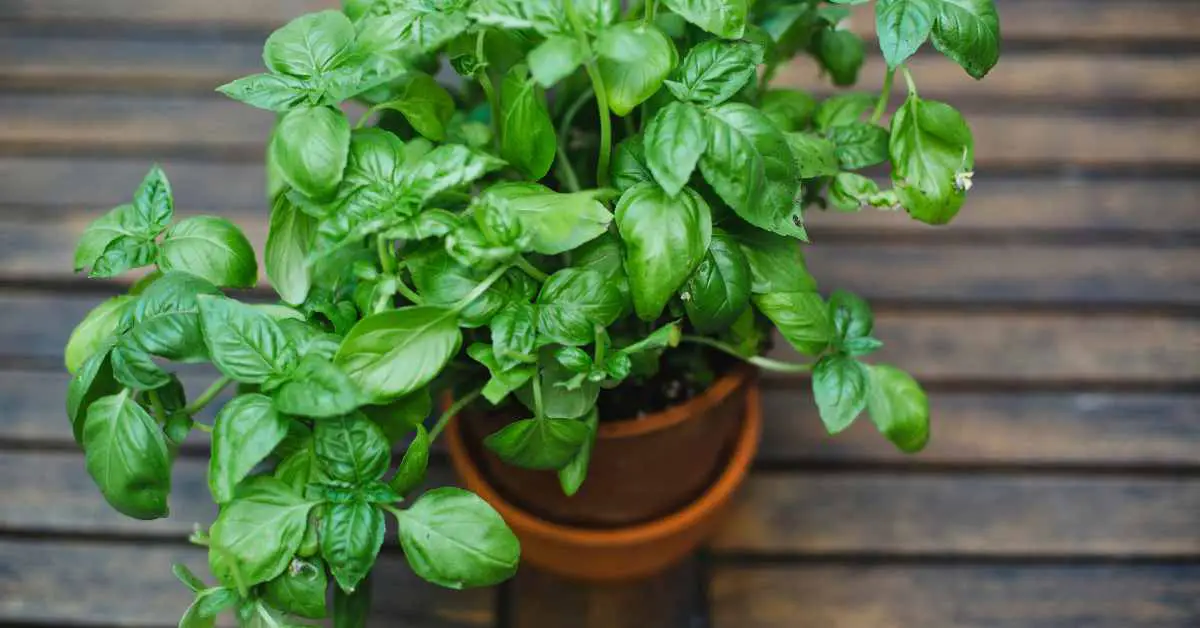Ants avoid plants with a strong fragrance, like basil, because it can suppress their own body odor or chemical secretions and disrupt their activities.
Can Ants Eat Basil? Ants do not eat basil due to the strong scent of aromatic oils, but they can attack basil plants to build their nest within the soil. Moreover, they can attack in search of honeydew or aphids living there. They do not cause damage to leaves and control pest populations, but they can increase the aphid population by mutually associating with them.
Ants can benefit basil plants by improving soil aeration and preparing compost from fallen leaves to recycle nutrients.
However, many devastating effects are also associated with ants’ attacks, like uncontrolled growth of aphids and comprised growth of plants.
Why do ants not eat basil?
Basil is a royal herb widely grown in the backyard because it is used in food preparation due to its sweet odor. It is a culinary herb, and ants get averted from the strong aroma of herbs.
Ants dislike basil leaves; that’s why it is commonly used as a repellent and keeps these insects away from indoor and outdoor areas.
These leaves can uplift or stimulate your mood and energize you, but these insects lose their mind whenever 3 or 4 leaves are placed close to them.
They have a strong odor due to the presence of aromatic oils or essential oils containing alcohol, esters, camphor, etc.
These essential oils give a sweet aroma to the leaves, providing a feeling of warmth.
Accordingly, ants move away from the plant because its odor irritates their receptors and is perceived as an unpleasant smell.
Most herbs, like spearmint, sage, and peppermint, do not attract ants due to their annoying odor. However, aphids, beetles, and slugs are the insects that get attracted to this plant, unlike ants.
Why do ants attack basil plants?
Ants do not attack basil to eat the leaves, but they can be infested when building a nest inside the soil of a potted plant. Wet and warm soil provides an ideal space to construct their homes.
Moreover, they can come towards basil in search of honeydew produced by aphids living there.
These aphids are green-colored insects that are not clearly visible, as they hide inside folded leaves.
However, aphids release sweet secretions or honeydew with a sweet odor that can attract ants. They can also attack to get nectar from flowers to fulfill their carbohydrates requirements.
You have to stop them from reaching leaves because they get symbiotically associated with aphids and protect them from pests.
It leads to uncontrolled growth of aphids that are not considered safe for your plants as they suck sap from stems and leaves and lead to their death.
How do you protect basil plants from ants?
You have to deal with an aphid infestation to get rid of ants because they are mutually associated with each other for food and protection.
Chili garlic spray
It is essential to remove aphids on plants to get rid of ants because these insects usually come for aphids. A chili garlic spray is quite effective in the removal of undesired pests.
Mix 50g of cayenne pepper with one bulb of garlic or 1 and 1/2 bulbs of onion by blending them in a mixer or blender.
It is better to strain the blended mixture because it gives you a smooth liquid having no chunks or larger residues.
Prepare a liquid soap by adding one teaspoon of dishwashing liquid in 500ml of water and add this to the blended mixture.
After that, mix it well and apply it to the surface of the leaves. The odor of onion and garlic helps remove these annoying insects from your plant.
Mouthwash solution
Mouthwashes attract ants due to their pleasant odor, but mint mouthwashes can repel these insects from basil plants.
Mix almost ½ to 1 cup of mouthwash in 250ml to 500ml of water to prepare a repelling solution against these insects.
Thymol is the common ingredient in mouthwashes and pesticides, which can help remove their scent trails and kick them off from the leaves.
It is not recommended to use a mouthwash with a sweet taste like that of food because it can attract more ants.
Furthermore, lavender and mint mouthwashes are good to consider for protecting the plant from these insects.
Soap and oil
A soap and oil mixture can remove ants because it dissolves their hard exoskeleton in the viscous oil. You can use vegetable oil and dishwashing soap to prepare a spraying solution.
Add ½ or 1 tablespoon of soap into 1/2 or 1 cup of oil and mix them well. Add around 5 to 6ml of prepared solution in 500ml of water to make a spraying solution.
Shift the solution into a spray bottle and spread it on the leaves to wash these aphids and ants off the leaves by dissolving their bodies.
Put herb plants
You can use herbs to prevent ants’ entry as they do not like the smell of rosemary, mint, thyme, and lavender. Grow these herbs in different pots and put them close to the basil plant.
Herbs give off a strong odor that can help repel these insects and protects your plant. You can also keep them in the doorway or entry points to restrict their entry.
You can also put dry leaves of herbs, like mint leaves and thyme, in the periphery of the targeted plant to act as a barrier. However, they are only effective until their aroma does not fade.
You can replace the leaves after a few days to maintain their impact on these tiny creatures. Furthermore, some people like to crush herbs to make a powder for spreading around basil.
Related Articles:

